What Does Moz Local Do?
Moz Local is a paid business listing syndication and distribution service. It also offers a free “Check Listing” feature that lets you see how a business is currently performing in terms of completeness of citations. Once you purchase a syndication package you can use the Check Listing report to follow and validate citation improvements over time.
Moz Local Citation Sites & Aggregators
Moz distributes business listing data directly to 43 citation sites and aggregators.
Here is how it breaks out:
- The 43 Direct Network sites are listed below with direct distribution.
- The 3 Indirect Network sites. These sites get their business data from the Direct Network. The notion is that once the Direct Network is updated, the Indirect Network sites will follow.
- Lastly, 4 Primary Sources are used to validate listing data before distribution. The info you enter must match one of these or it will be rejected.
The Direct Network includes:
Foursquare
Supermedia
Data Axle(Formerly Infogroup)
Localeze
Factual
Infobel/US Info
ShowmeLocal
Navmii
Better Business Bureau(BBB)
DexKnows
tupalo
whereto
Yalwa
Brownbook
Judy’s Book
Citysquares
UScity.net
EzLocal
n49.com
ChamberofCOmmerce
NextDoor
Neustar/Localeze
Citysearch
Insiderpages
BOTW
Bing
Acxiom
TomTom
HERE
Waze
UBER
SuperPages
YP.com
tupalo
Opendi
iglobal.co
Manta
mylocalservices.com
Localstack
acombio.com
Pages24
Cylex
find-open.com
the indirect network includes:
Yelp
YellowPages
Hotfrog
The Primary Sources Include:
Google Business Profile (Formerly Google My Business)
Apple Maps
Amazon
Response from Moz About The Indirect Network:
“We scrape these directories for listing consistency, completeness, accuracy and duplicates. Since we do not submit to them directly we cannot guarantee listing information updating in Hotfrog, Yelp or Yellowpages. The main aggregators do feed to these directories but as you know they also source data from their own database as well as (like Yelp) directly from users.”
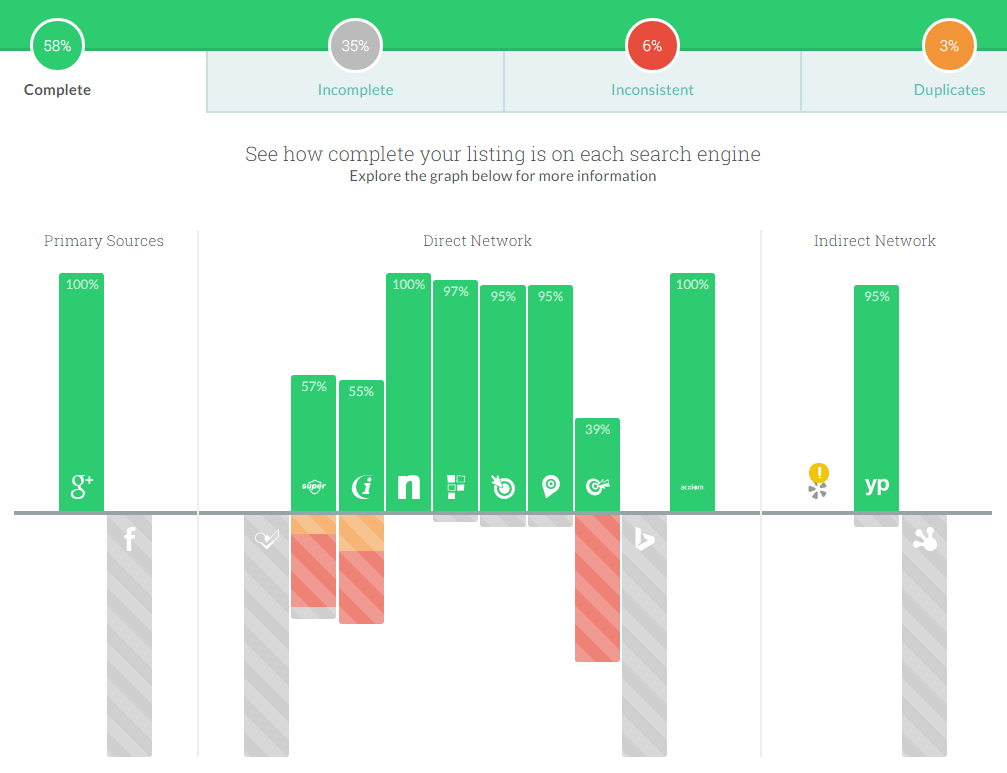
The Check Listing report (above) provides a snapshot of citation performance for an individual listing, with percentages for Complete, Incomplete, Inconsistent and Duplicate listings. These are aggregates of the same measures for each of the 15 citations. Drilling down into each tells you which listing was found and measured, what is needed to complete a profile and links to duplicates found.
All pricing for Moz Local is per location, which you should include in your calculations for costs if you are managing more than a single business or multiple business locations.
The table below shows pricing per month (per location), and per year (per location) totals for Moz Local pricing.
Moz Local Pricing 2023:
| Moz Local Subscription | Monthly | Yearly |
|---|---|---|
| Lite | $14 | $129 |
| Preferred | $20 | $125.30 |
| Elite | $33 | $209.30 |
Update: Does Moz Local Work?
Here is a quick list of updates from our original posts:
• Price: Increased to $129 per year, per listing.
• Add new listings in bulk: Still works, improved performance.
• Bulk export and edit: Still works, improved performance.
• Edit listings manually: Manual editing has been available for about 7 years.
• Reporting: Moz has reporting for both single locations, multiple roll-ups, and competitors.
• Bulk reporting: We’re still waiting for an export of the scores by citation.
• Dashboard search: Improved.
• Consistency of metrics: Seems to have improved, but we still encounter inconsistencies (see below).
• Google / Facebook verification: Still a requirement. Still annoying, but I get the point.
• Yahoo: Is no longer part of the Moz Local network.
How We Use Moz Local:
We are currently using Moz Local almost exclusively for business listing syndication. It works well for our needs. Of course, you can’t expect any business listing syndication service to do everything for you. Moz Local makes us more efficient, but we still do quite a bit of hands-on citation building and optimization. For example, removing duplicates is an important Local SEO activity. We can easily identify duplicate listings with Moz Local so that we can work to remove them.
We also use Moz Local for client reports. One challenge with Local SEO is how to demonstrate the value of citation building. We use the Moz Local network as a proxy for the larger citation landscape; if our Moz citations are good, we extrapolate that our other citation building efforts are also successful.
First we tried using the scores Moz calculates. What we found is that they are inconsistent. The percentages can fluctuate – even when the same report is run minutes apart. Because we don’t know how these are calculated we can’t explain the fluctuations to our clients.

We needed something more reliable. Using the data Moz provides we developed our own set of metrics we call VAC: Visible, Accurate, Complete. This is similar to Moz’s “Complete” score, but we have more control over, and insight into, the variables. The following analysis refers the VAC score.
Yes, Moz Local Works. Here’s the proof.
For our needs, Moz Local is the best business listing syndication service. After 7 months in our program our average VAC score is 94%. Our analysis follows:
Let’s take a look at our longest running client. We added our first locations for this client in May, 2014. To date, 35% of our listings have been running for 16 months or longer. 93% of our listings have been running for 7 months or longer.
This report reads right to left, with the leftmost column being the most recent month. Red/orange indicates the lowest VAC scores (~50%) while green indicates the highest scores (~100%). The trend is pretty obvious. When we launch a new store it scores pretty low. We quickly see measurable improvement and a consistent trend toward more complete profiles.
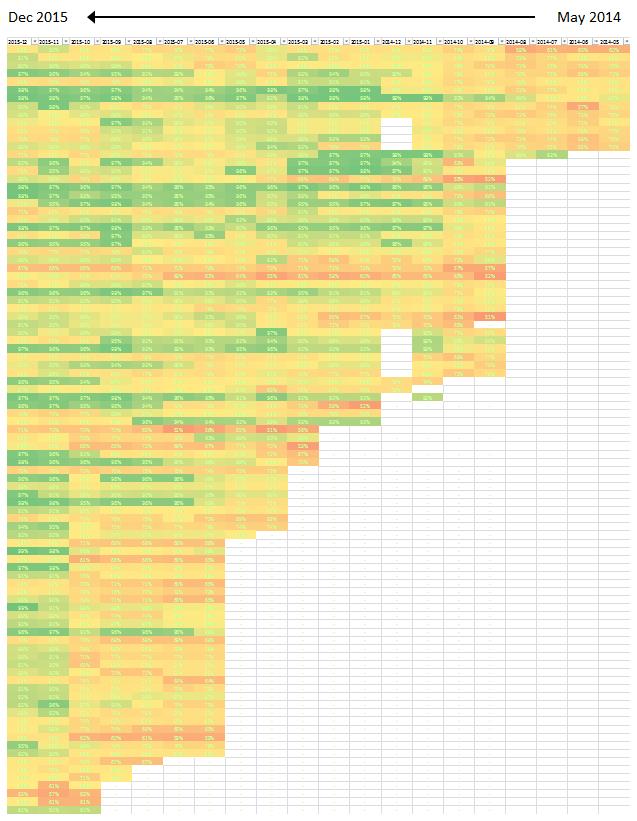
Clients like colors. We like numbers.
For each listing we compared the first measurement with the most recent. We were disappointed and a bit surprised to find no correlation between time in the program and increase in performance. Worse, some locations even saw a decrease!
Ok, what gives? Our reports show that every location has improved over the baseline, but some have fallen off in recent months. Why?
- A few have moved to a new address. This makes sense. These have basically re-set. We expect they will pick back up and follow the positive trend.
- For a number of reasons an address or name could change in the ecosystem; the client changed Facebook, Google made a random change, etc. Moz Local is extremely literal about addresses. Change from “St” to “St.” and you’ll see a drop.
This makes sense for individual listings, but our reports suggest something else happened.
Several listings dropped dramatically at the same time. Why?
In August, 2015 Moz Local added Citysearch, InsiderPages and Bing to the Direct Network and removed Yahoo completely. The VAC score of some of our listings fell off dramatically when these new distribution channels were added. The point of the Direct Network is that those sites accept data directly from Moz.
Presumably this creates and updates listings faster, more accurately, and more completely than other methods. However, in some cases we had active listings on InsiderPages and Citysearch, but once direct distribution began these listings completely disappeared. Thus, the drop-off shown in our VAC report is clearly correlated to this changeover.
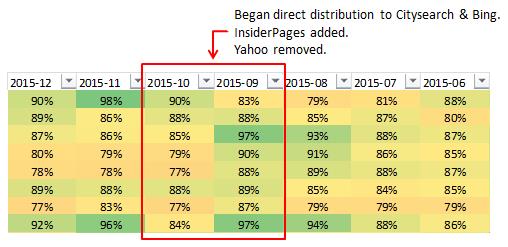
Update: Our January, 2016 reports show that Citysearch and InsiderPages DID update all but handful of locations. Also, they all have strong 90%+ scores.
What happens when we factor out these events?
Next we looked at the highest score for each location vs. the baseline, rather than the most recent. This removes events that skew the trend. This analysis validates that our Local SEO program with the support of Moz Local does improve citation performance:
- After 7 months we see an average VAC score of 90% and 14% lift from baseline.
- After 15 months we have an average score of 93% and 19% lift.
For this client our average baseline VAC is 78%. This is actually artificially high since many had been in our Local SEO program for some time prior to adding them to Moz. We find many other businesses start out in the 50% – 65% range. Those with citation problems or who have never paid any attention to business listings can start much lower. Irrespective of the starting point, we see the same trend toward improved performance.
As we always tell clients, Local Search is constantly changing. What matters is the overall trend, not just last month’s numbers. Google seems schizo sometimes. Yext is cutting deals left and right. Our tools (like Moz Local) don’t always get things right. On the whole, performance improves over time.
The Plateau Problem: Is 100% Possible?
Our average performance tops out around 94%. Why can’t we get our Moz Local scores to 100%? There are several reasons, but the main one is that Moz only syndicates directly to 10 of the 15 citations they track. It’s up to us to manage the others.
Even so, shouldn’t the Direct citations reach 100%? Well, no. I might be mistaken, but I don’t think all of their partners accept all of the content Moz wants to see for a 100% complete profile. Lastly, you can’t control what Moz does; Moz sometimes latches on to the wrong listing, and it sometimes can’t find any listing at all (even when we KNOW it exists).
The thing is that 100% doesn’t matter. 94% means you have robust profiles across top citations and that content is available to hundreds of other citation sites. Maybe you don’t have 5 photos on every citation. No sweat. There are more important things to focus on.
The bottom line is that Moz Local provides us with an efficient means of updating top citation sites and aggregators and for monitoring performance over time. It highlights when problems arise and enables us to continuously improve our process and service to clients.
How to Get to 100% on Moz Local (2016):
If you need to impress your clients with that A+, and have time to spare, we have a few tips on how to optimize citations:
- Claim your Google My Business and Facebook pages (duh).
- Moz can’t score a Yelp listing unless it has at least one review. Every business should be paying attention to reviews anyway.
- Claim Bing, Foursquare, Supermedia and Hotfrog.
- Complete phone verification for YP.com.
- Clean up duplicates.
Problems with Moz Local (2016):
No solution is perfect. What matters is finding the one that works for you. Moz has some quirks, but we find a lot of benefit from the tool. These are mostly bugs, not systemic problems or product limitations. They do impact our work, but we also know bugs usually get fixed.
Missing Data
Sometimes the tool can’t find a listing. Bing is one of the most frustrating. We manage our listings on Bing directly, so we know the listings exist and that they are complete. Why can’t Moz find them?
Direct Network failures
Update: See above. Citysearch and InsiderPages are working now.
As discussed above, Citysearch, InsiderPages and Bing were added to the Direct Network. Presumably has a direct connection to each, to both deliver our data and report back with the live listing status. Unfortunately this is not always the case.
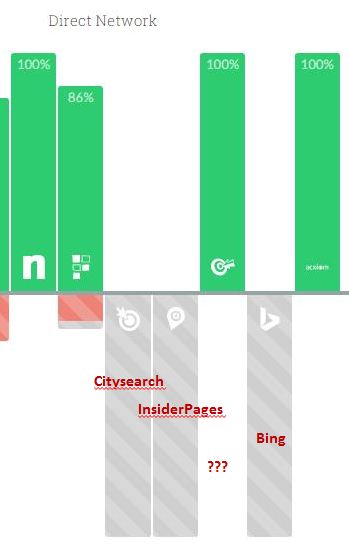
Reports the wrong location
There are duplicate listings out there. That’s part of the point of citation work. Sometimes Moz latches on to a bad listing. We even see this happen when we have a verified, well-optimized listing. Worse, it can pick up other businesses altogether. There is no way to correct this. I’m told that “the algorithm selects whichever listing it finds most accurate”. There should be a way to provide the correct one.
Moz Local Duplicates
Moz reports any listing it finds that may be a duplicate. This is actually a great tool to help clean up duplicates. But it’s wonky. It sometimes reports the very listing it is measuring as a duplicate. Huh? There is a button to “ignore” each duplicate, but they keep coming back. I guess that’s true with lots of things I try to ignore, but it’s annoying. It’s not clear what “ignoring” does. Are these excluded from the “duplicates” metric? This feature could be more clear and useful.
Suspended listings
Verified listings are sometimes suspended if either Google or Facebook changes. We’ve seen cases where the listing Moz is reports as incorrect is identical to the info in our Moz listing. Sometimes we have trouble getting them re-verified, and there is apparently no way around this.
Viewing individual listings
It’s impossible to select a single listing from the “verified listings” dashboard, which is necessary to add tags or view Insights. To view a single listing you have to search, but you need something that is both searchable and unique to that one listing. Sometimes the phone number is the only unique attribute. It’s workable, but it can be a long road to get there. If you search this “720-468-0012” or this “(720) 468-0012” you don’t get any results. You must use this format “7204680012”.
features We Really Like (2023):
Foursquare Verification
This isn’t new, but it is incredibly useful. We find that it is difficult to complete phone verification for multi-location clients. Moz elegantly solves this problem.
Manually editing Listings
This was conspicuously missing for quite a while. The ability to pop in for a quick edit is nice.
Tags for Listings
Tags are helpful for searching and organizing large numbers of listings. They will also be helpful organizing listings for Insights reports. Our only complaint is that finding and using more than a handful of tags is unwieldy in the dashboard.
More search options
Searching for specific listings in the dashboard was one of our challenges early on. The addition of new search options certainly makes things easier.
Discounted renewals
Pricing bounced around a bit in 2015. We’re not surprised that the initial $49 went up. The current price seems fair and on par with other solutions. Given the increase, we were pleased when they added a discount for renewals.
review templates
You can create templates for responding to customers reviews and tag them for specific purposes. Templates for 5 star reviews, 1 star reviews, and neutral ratings, for example, can be created to help streamline reputation management.
Conclusion
We like Moz Local and use it almost exclusively. Without exception our clients in the program see improvements in citation performance. Could we achieve the same results with other distribution/syndication services? Probably.
As an SEO tool, Moz Local works for us. We rely heavily on the Check Listing report and regularly optimize using the duplicates finder. (@Moz – Check Listing solves a thorny Local SEO problem for us. PLEASE don’t ever take it away!).
All products have their quirks. As it stands today, the benefits of Moz Local outweigh a few frustrations. As for the new Insights feature we’re waiting to see how the beta shakes out. It’s an obvious direction for the product, but we’re not sure if the benefit will justify the premium.
Moz Local is a solid business listing syndicate service supported by a modern and useful management and reporting dashboard. Give it a try.
***
Two Octobers is a results-driven digital marketing agency in Denver, CO. We don’t deal in hype. We don’t care about ego. We do care about real results. If you’re looking for a digital partner without the buzzwords or BS, you’ve come to the right place.




I have quick question – point of clarification for moz local, what is the shtick when and if you discontinue service? Huge compliments for your review and visualization of change! Thanks, as i was starting to get a bit nervous after reading some early 2014 reviews on the product and found many strikes against for customer service and for the delays in seeing updates.
Hi Holly. Sorry for the slow reply. This one slipped past. The honest answer is that I’m not 100% sure. I haven’t continued to track any that we stopped. As I understand it this is what you can expect:
Moz will “release” any listings they claimed. This means that each citation site will be free to edit the data, but that doesn’t mean they will. All directories and databases periodically evaluate and update their data. Whenever that happens your data may be overwritten. You may also begin to see more duplicates. However, I suspect that the “correct” data you pushed out via Moz Local will have some longevity. 1) The data you provided has (presumably) been further extended via the sites and databases in the Moz Local network, meaning the correct data is found on many, many sites. This may give it some authority. 2) Unlike Yext, Moz Local affects the core database that each citation site. Thus it should not be replaced unless/until it is overwritten in a future data update.
Phil Rozek has a great post on the topic here. Be sure to read the comments as well.
We would love to hear about your experience. Let us know how it goes!
Hello, I am interested in which package you go for. I am a consultant and want to register my business but also want to register other businesses. Do you just use the basic package for each client? Thanks, Paul
Hi Paul,
For the most part we use the basic package. That provides submissions and distribution, now including Apple Maps and Yelp (March ’17?) and duplicate management. These are the features we use most. As an enterprise customer we have dedicated support, which is great. They offer a number of other metrics and reports. For the most part we are already getting these elsewhere and don’t (yet) see a compelling reason to change established processes. That said, they have a lot of good stuff in the pipeline. The product map they showed at MozCon is very interesting. We will be re-evaluating. IF I were launching a new agency business I would definitely consider the value of all of those metrics in one location (Professional). I would think that would be valuable for a small team or one-man show. If you’re talking about just your one business I would stick with Essential.
So, Moz Local distribution management (Essential package) is effective. We rely on it heavily. The benefit I see in the Professional grade is consolidated metrics and insights with efficiencies when reporting to clients.
GMB Insights:
https://moz.com/blog/moz-local-new-gmb-insights-support
Updated pricing since this post:
https://moz.com/local/pricing
Good luck and I hope this helps!